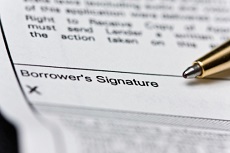Debt consolidation can be a very confusing concept because financial terminology is complicated and contracts can be very convoluted. The term itself, debt consolidation, is confusing because it can be used to describe a group of debt solutions or as an individual option. For simplification purposes we are going to use the term ‘debt consolidation’ to describe the general concept of combining multiple unsecured debts into one.
There are four options commonly sought by those looking to get out of a difficult financial situation through debt consolidation. This Debt Consolidation Solutions Blog Series is going to address each option in an individual article and then introduce an additional option not commonly considered as a debt relief option, but is effective. Here is the order the articles will be published:
- Unsecured Loans
- Home Equity Loans
- Settlement Programs
- Management Programs
- Chapter 13 (New, Additional Option)
Unsecured Debt Consolidation Loans
 An unsecured debt consolidation loan involves you taking out a personal loan and using it to pay off your unsecured debts. It may also be referred to as a signature loan or a personal loan. If you take out an unsecured loan to resolve a poor financial situation you will typically use this cash to pay off your debt, and then from that point on you will make one monthly payment toward this loan. This option is managed and executed by you; no help is provided from a third party company or professional.
An unsecured debt consolidation loan involves you taking out a personal loan and using it to pay off your unsecured debts. It may also be referred to as a signature loan or a personal loan. If you take out an unsecured loan to resolve a poor financial situation you will typically use this cash to pay off your debt, and then from that point on you will make one monthly payment toward this loan. This option is managed and executed by you; no help is provided from a third party company or professional.
To pursue this option you will need a good credit score in order to be approved. This type of loan is called an unsecured loan because is not secured against any asset or collateral - which increases the risk for lenders. In other words, if you are unable to make payments, your lender doesn’t have an opportunity to collect or force payment. You will need to prove you are responsible, trustworthy and capable of making full and timely payments in order to be approved for an unsecured loan.
In order for an unsecured debt consolidation loan to effectively improve your financial situation it must have a low enough interest rate to lower your monthly payments. This can be difficult because, due to the risk for lenders, the interest rates are often set fairly high.
This option doesn’t eliminate your debt; an unsecured debt consolidation loan merely moves your debt from one place to another. It may simplify your payment process and give you some extra breathing room if you are able to lower your monthly payment. However, if you are already in financial trouble, this may just lengthen an already stressful situation. This is not an advisable debt consolidation solution because it is an attempt to borrow your way out of debt.
Here’s the Trick
When taking out an unsecured debt consolidation loan you must make sure it will improve your financial situation. If you get approved for a large enough loan to pay off all of your debt you will be left with one unsecured loan, one payment. However, if you can’t get approved with the right terms you will be putting yourself in a worse situation than where you started.
Do your research before signing any contracts. Double and triple check the interest rates, payment schedule timeline and monthly payment amounts. Your monthly payment amount MUST be lower than the total of the multiple monthly payments you make currently in order to improve your situation. Also, make sure you are comfortable with the payment schedule and the total amount you will pay when it is completed. Chances are this amount will be higher than the original amount you owe because, in order to ease your current financial situation and pay off your debt completely, you will have to make payments for an extended period of time.
Debt Consolidation Solutions Blog Series
Check back in a few days or subscribe to our blog to learn about the next debt consolidation solution: home equity loans. If you want to know more now, download our free eBook, “The Truth About Debt Consolidation.”



